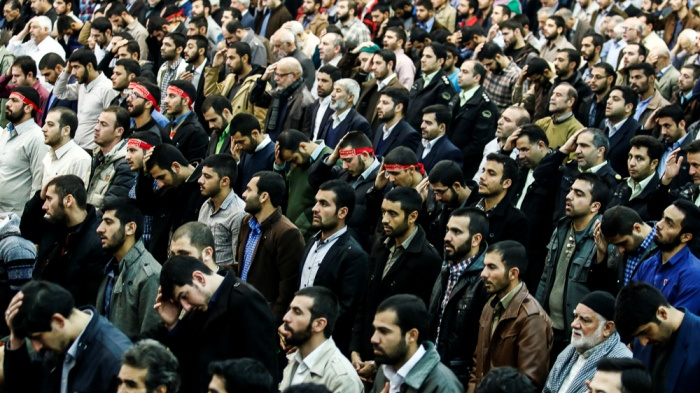Iran’s Friday Prayers: US Sailors, Elections, JCPOA and Saudis

(Photo: Arash Mirsepasi/YJC)
Iran’s Friday prayers on January 15, 2016 revolved around four key subjects. The brief detention and release of American sailors in the Persian Gulf, the upcoming elections for the tenth parliament and the Council of Experts, the United States’ destructive attitude towards the nuclear agreement and Saudi Arabia.
In Tehran, Ayatollah Movahhedi Kermani, leader of the prayers, addressed the detention of American sailors by Iran’s marine patrol. He called the detention of sailors a sign of Iran’s power and congratulated the IRGC marine forces on defending national borders. Ayatollah Mostafa Ulama, the leader of Friday prayers in Kermanshah, in western Iran, also praised the Revolutionary Guards for their “decisive measure” which even led the Americans to confess to their humiliation. In Tabriz, Ayatollah Mojtahed Shabestari called the detention a “clear message to the West”, that Iran will respond with full force if they make the smallest mistake, and stated that arresting the sailors showed the alertness of Iranian military in protecting national borders. The IRGC’s conduct showed that “the Islamic establishment regards observance of Islamic ethics as a principle even at the height of power” said Hojjatoleslam Saeidi in Qom, while in Yasouj, in southwestern Iran, the Friday prayers’ leader Hojjatoleslam Hosseini stated that arresting American sailors “shattered the military image of the US in the Middle East.”
Movahhedi reminded the audience that the United States will never cast away its browbeating attitude and its renege on promises. “Even if the United States implements the JCPOA, it will enforce [sanctions] in another situation, under another title” he said. He asked the officials to carry out a retaliatory approach in case Americans violate the nuclear agreement. In Gorgan, in northern Iran, Ayatollah Nourmofidi, one of the few pro-Reformist Friday prayers’ sermonizers, also warned about the US rescinding its JCPOA promises, calling for the government officials to take a clear, explicit stance in this regard. “The US should remove sanctions for the sake of its own reputation” he said. In Ardebil, in northwestern Iran, Ayatollah Ameli warned that “if the JCPOA turns into the number one priority of national security and foreign policy of the country, Iran will lose everything and turn into a cautious, conservative country.”
In Tehran, Friday prayers’ leader Ayatollah Movahhedi Kermani pointed to the execution of the Saudi Shia cleric Ayatollah Nimr, stating that “his martyrdom will definitely undermine the Saudi household.” Mojtahed Shabestari reiterated similar remarks in Tabriz, adding that the Saudi regime aims to stoke tensions. In Ilam, in western Iran, the Friday prayers’ leader called for Muslim countries to show simultaneous power and rationality against Saudi Arabia. “While Iran has confronted global powers, Saudi Arabia is a mercenary that carries out what its masters dictate,” said Hojjatoleslam Lotfi.
In Tehran, Movahhedi Kermani also addressed the upcoming elections for the parliament and for the Council of Experts that is the body in charge of appointing the next supreme leader and supervision over his conduct. “Those who enter the parliament … should confront the United States just as the Supreme Leader” he said. In Tabriz, Mojtahed Shabestari called for the presence of Iranians from all walks of life in the upcoming elections. He also called for citizens’ vigilance in selecting the best of candidates. In Ahwaz, in southwestern Iran, Ayatollah Heydari, warned about “forget[ing] the betrayal of the ‘seditionists’”, 2009 Green Movement elements, and the US’ spies infiltrating the parliament or the Council of Experts.

